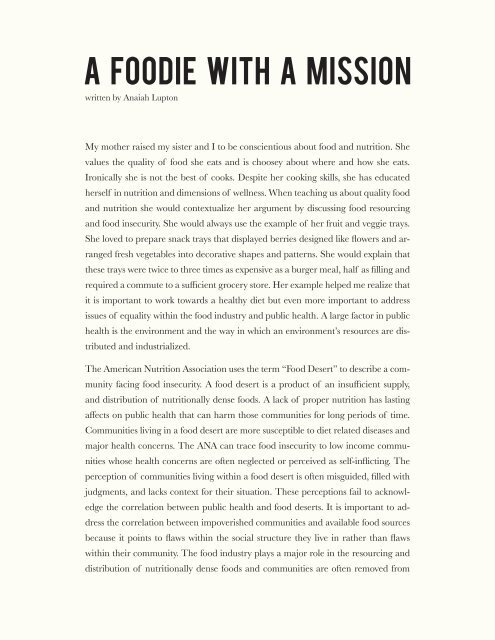The Natural Issue (v.14)
You also want an ePaper? Increase the reach of your titles
YUMPU automatically turns print PDFs into web optimized ePapers that Google loves.
a foodie with a mission<br />
written by Anaiah Lupton<br />
My mother raised my sister and I to be conscientious about food and nutrition. She<br />
values the quality of food she eats and is choosey about where and how she eats.<br />
Ironically she is not the best of cooks. Despite her cooking skills, she has educated<br />
herself in nutrition and dimensions of wellness. When teaching us about quality food<br />
and nutrition she would contextualize her argument by discussing food resourcing<br />
and food insecurity. She would always use the example of her fruit and veggie trays.<br />
She loved to prepare snack trays that displayed berries designed like flowers and arranged<br />
fresh vegetables into decorative shapes and patterns. She would explain that<br />
these trays were twice to three times as expensive as a burger meal, half as filling and<br />
required a commute to a sufficient grocery store. Her example helped me realize that<br />
it is important to work towards a healthy diet but even more important to address<br />
issues of equality within the food industry and public health. A large factor in public<br />
health is the environment and the way in which an environment’s resources are distributed<br />
and industrialized.<br />
<strong>The</strong> American Nutrition Association uses the term “Food Desert” to describe a community<br />
facing food insecurity. A food desert is a product of an insufficient supply,<br />
and distribution of nutritionally dense foods. A lack of proper nutrition has lasting<br />
affects on public health that can harm those communities for long periods of time.<br />
Communities living in a food desert are more susceptible to diet related diseases and<br />
major health concerns. <strong>The</strong> ANA can trace food insecurity to low income communities<br />
whose health concerns are often neglected or perceived as self-inflicting. <strong>The</strong><br />
perception of communities living within a food desert is often misguided, filled with<br />
judgments, and lacks context for their situation. <strong>The</strong>se perceptions fail to acknowledge<br />
the correlation between public health and food deserts. It is important to address<br />
the correlation between impoverished communities and available food sources<br />
because it points to flaws within the social structure they live in rather than flaws<br />
within their community. <strong>The</strong> food industry plays a major role in the resourcing and<br />
distribution of nutritionally dense foods and communities are often removed from<br />
20
















